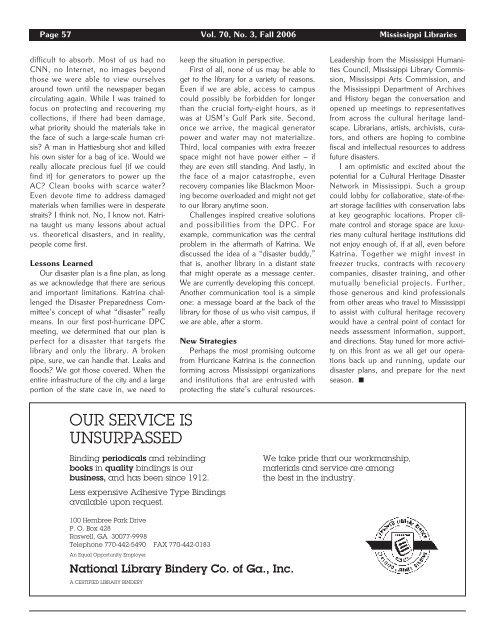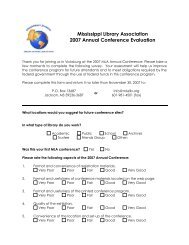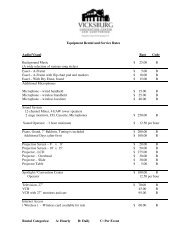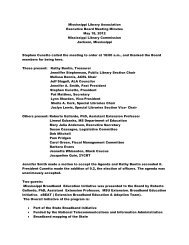Full Text (PDF) - Mississippi Library Association
Full Text (PDF) - Mississippi Library Association
Full Text (PDF) - Mississippi Library Association
Create successful ePaper yourself
Turn your PDF publications into a flip-book with our unique Google optimized e-Paper software.
Page 57 Vol. 70, No. 3, Fall 2006 <strong>Mississippi</strong> Libraries<br />
difficult to absorb. Most of us had no<br />
CNN, no Internet, no images beyond<br />
those we were able to view ourselves<br />
around town until the newspaper began<br />
circulating again. While I was trained to<br />
focus on protecting and recovering my<br />
collections, if there had been damage,<br />
what priority should the materials take in<br />
the face of such a large-scale human crisis<br />
A man in Hattiesburg shot and killed<br />
his own sister for a bag of ice. Would we<br />
really allocate precious fuel (if we could<br />
find it) for generators to power up the<br />
AC Clean books with scarce water<br />
Even devote time to address damaged<br />
materials when families were in desperate<br />
straits I think not. No, I know not. Katrina<br />
taught us many lessons about actual<br />
vs. theoretical disasters, and in reality,<br />
people come first.<br />
Lessons Learned<br />
Our disaster plan is a fine plan, as long<br />
as we acknowledge that there are serious<br />
and important limitations. Katrina challenged<br />
the Disaster Preparedness Committee’s<br />
concept of what “disaster” really<br />
means. In our first post-hurricane DPC<br />
meeting, we determined that our plan is<br />
perfect for a disaster that targets the<br />
library and only the library. A broken<br />
pipe, sure, we can handle that. Leaks and<br />
floods We got those covered. When the<br />
entire infrastructure of the city and a large<br />
portion of the state cave in, we need to<br />
keep the situation in perspective.<br />
First of all, none of us may be able to<br />
get to the library for a variety of reasons.<br />
Even if we are able, access to campus<br />
could possibly be forbidden for longer<br />
than the crucial forty-eight hours, as it<br />
was at USM’s Gulf Park site. Second,<br />
once we arrive, the magical generator<br />
power and water may not materialize.<br />
Third, local companies with extra freezer<br />
space might not have power either – if<br />
they are even still standing. And lastly, in<br />
the face of a major catastrophe, even<br />
recovery companies like Blackmon Mooring<br />
become overloaded and might not get<br />
to our library anytime soon.<br />
Challenges inspired creative solutions<br />
and possibilities from the DPC. For<br />
example, communication was the central<br />
problem in the aftermath of Katrina. We<br />
discussed the idea of a “disaster buddy,”<br />
that is, another library in a distant state<br />
that might operate as a message center.<br />
We are currently developing this concept.<br />
Another communication tool is a simple<br />
one: a message board at the back of the<br />
library for those of us who visit campus, if<br />
we are able, after a storm.<br />
New Strategies<br />
Perhaps the most promising outcome<br />
from Hurricane Katrina is the connection<br />
forming across <strong>Mississippi</strong> organizations<br />
and institutions that are entrusted with<br />
protecting the state’s cultural resources.<br />
Leadership from the <strong>Mississippi</strong> Humanities<br />
Council, <strong>Mississippi</strong> <strong>Library</strong> Commission,<br />
<strong>Mississippi</strong> Arts Commission, and<br />
the <strong>Mississippi</strong> Department of Archives<br />
and History began the conversation and<br />
opened up meetings to representatives<br />
from across the cultural heritage landscape.<br />
Librarians, artists, archivists, curators,<br />
and others are hoping to combine<br />
fiscal and intellectual resources to address<br />
future disasters.<br />
I am optimistic and excited about the<br />
potential for a Cultural Heritage Disaster<br />
Network in <strong>Mississippi</strong>. Such a group<br />
could lobby for collaborative, state-of-theart<br />
storage facilities with conservation labs<br />
at key geographic locations. Proper climate<br />
control and storage space are luxuries<br />
many cultural heritage institutions did<br />
not enjoy enough of, if at all, even before<br />
Katrina. Together we might invest in<br />
freezer trucks, contracts with recovery<br />
companies, disaster training, and other<br />
mutually beneficial projects. Further,<br />
those generous and kind professionals<br />
from other areas who travel to <strong>Mississippi</strong><br />
to assist with cultural heritage recovery<br />
would have a central point of contact for<br />
needs assessment information, support,<br />
and directions. Stay tuned for more activity<br />
on this front as we all get our operations<br />
back up and running, update our<br />
disaster plans, and prepare for the next<br />
season. <br />
OUR SERVICE IS<br />
UNSURPASSED<br />
Binding periodicals and rebinding<br />
books in quality bindings is our<br />
business, and has been since 1912.<br />
Less expensive Adhesive Type Bindings<br />
available upon request.<br />
We take pride that our workmanship,<br />
materials and service are among<br />
the best in the industry.<br />
100 Hembree Park Drive<br />
P. O. Box 428<br />
Roswell, GA 30077-9998<br />
Telephone 770-442-5490 FAX 770-442-0183<br />
An Equal Opportunity Employer<br />
National <strong>Library</strong> Bindery Co. of Ga., Inc.<br />
A CERTIFIED LIBRARY BINDERY














